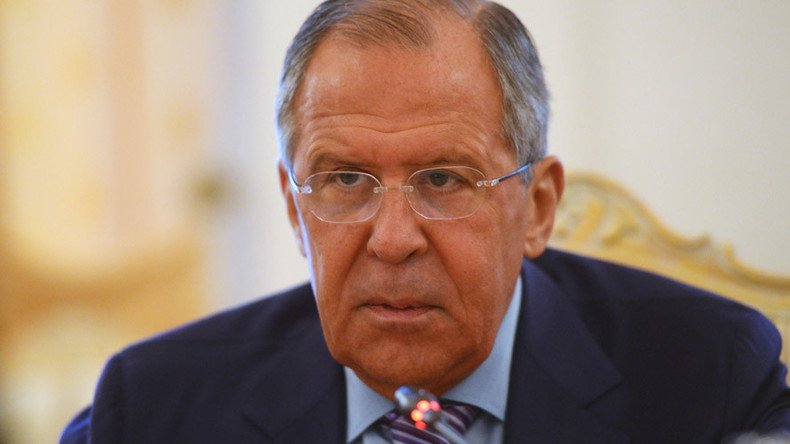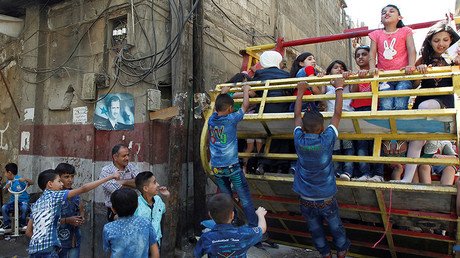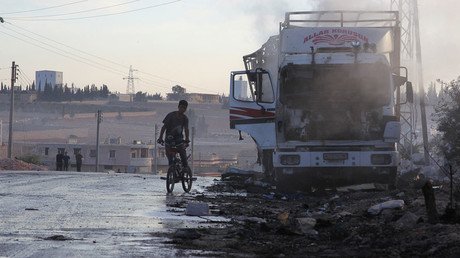US ‘spare Nusra for plan B’ to change regime in Syria – Lavrov

The US is keeping jihadist group al-Nusra for a “Plan B”, potentially to overthrow Syrian President Assad, Russian Foreign Minister Sergey Lavrov said in an interview with the BBC.
Speaking to the British outlet about increased violence in Syria, including in Aleppo, Lavrov said that Washington has still not delivered on its promise to persuade US-backed rebels to separate from Jabhat al-Nusra jihadists.
The Russian Foreign Minister also said that the reason for this could be Washington’s desire to “change the regime” in the country.
"They still, in spite of many repeated promises and commitments ... are not able or not willing to do this and we have more and more reasons to believe that from the very beginning the plan was to spare al-Nusra and to keep it just in case for Plan B or stage two when it would be time to change the regime," Lavrov said.
The separation of so-called “moderate” anti-government fighters from terrorist groups is one of the cornerstones of the Russia-US brokered peace deal for Syria.
Lavrov’s statement came on the first anniversary of the Russian anti-ISIS air campaign at the request of President Assad. On September 25 the US envoy to the UN, Samantha Power, called Russia’s actions in Syria “barbarism,” with Lavrov saying such rhetoric is “unacceptable.” When questioned about alleged civilian casualties caused by Russian strikes in Aleppo, Lavrov said that there was “no meaningful proof.”
"We are not using any munition which is prohibited by the United Nations," he added.
Instead Lavrov noted that the West including the US is remaining silent over terrorist re-supplies in the city during the humanitarian pauses agreed between Moscow and Washington. "Every time these pauses have been used by Nusra to get from abroad more fighters, more ammunition and more weapons,” the official said.
The deteriorating situation in Aleppo was the focus of Lavrov’s telephone call with US State Secretary Kerry on Friday, according to the statement from Russia’s foreign Ministry. During the conversation Kerry asked Russia to stop its current counter-terrorist strikes in Aleppo to re-activate the truce deal there.
Lavrov countered that it’s the militants “controlled by al-Nusra” who jeopardize peace efforts. The terrorists are “shielding themselves with other armed groups” in order not to be attacked, Lavrov noted, stressing that Washington needs to do more to persuade moderate forces to dodge any cooperation with Jihadists.
Yet Russia “is still ready for an open dialogue with the US on all key questions of settling the Syrian crisis,” Lavrov added.
The US appears less willing to find solutions after the State Department spokesperson Mark Toner said his country is “on the verge” of breaking up cooperation with Moscow on Syria.
Aleppo remains one of the key examples of civilian suffering during the Syrian war. The UN estimates that some 250,000 thousand people in the ravaged city are in need of basics like medicine and water. Humanitarian assistance to the city was part of the deal clinched by Lavrov and his US counterpart John Kerry on September 9.
However it suffered a major setback when a UN-backed convoy was attacked just 10 days later by unknown assailants, leaving 21 people dead.
While speaking with Lavrov the BBC claimed that there is “evidence” proving that the attack involved the Russian military. The official countered that he “would like to see that evidence,” adding that one should wait for the results of the investigation launched by the UN.
Aside from the Syrian deadlock, Lavrov has been also quizzed by the British outlet over the alleged Russian role in the crash of MH17 in 2014. The official was asked if he wanted to apologize for the incident after the Dutch-led international inquiry found that the missile system which downed the plane was allegedly brought from Russia.
Lavrov noted that the investigation is still ongoing, and that Russia has provided all the relevant information to the international team.
During the presentation of the results on September 28 the Dutch-led specialists did not implicate any exact Russian officials and residents, stressing merely that they have a list of some 100 culprits, without disclosing their nationalities.














